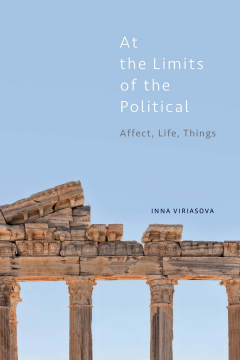
Additional Information
Book Details
Abstract
The question of the limits of the political permeates the history of western political thought and has been at the forefront of debates in contemporary political philosophy, especially in French and Italian contexts. This book argues that the question of radical political exteriority fell into neglect despite post-War critiques of totalitarian political ontology. The notion of ‘the political’ developed into a new form of totality, one which admits the impossibility of closure and yet refuses to let go of its totalizing ambition. Inna Viriasova addresses this problem by offering a critical introduction to the debate on the concept of the political in contemporary continental philosophy, and develops an innovative perspective that allows us to rethink the limits of the political in affirmative and realist terms. The book explores such recent developments as Roberto Esposito’s notion of the impolitical, Giorgio Agamben’s concept of bare life, Michel Henry’s radical phenomenology of life, the speculative realist philosophy of Quentin Meillassoux, as well as Buddhist political thought. The book makes a vital contribution to an emerging body of literature in contemporary philosophy that renews the fundamental questions of political ontology in response to the multiplying crises of inclusion that challenge democratic communities today.
In this book, Inna Viriasova competently and brightly retraces the most influential theories of the impolitical, connecting them to questions of great relevance: with respect to political action, how does what is outside its external borders act? How does the political ‘outside’ establish itself and what effects does it produce when it is situated into it? In a substantial philosophical weave intertwining all contemporary thought, the author offers original and innovative answers to these questions.
Roberto Esposito, Professor of Theoretical Philosophy, Scuola Normale Superiore, Italy
Inna Viriasova is a Lecturer in the Department of Politics at Acadia University, where she teaches Political Theory. Her current research is in the areas of modern and contemporary political philosophy, critical refugee studies, non-Western political thought, and post-humanist security. She has published articles on questions of freedom, life, biopolitics, community, animism, speculative realism, and human displacement, as well as co-edited a book entitled Roberto Esposito: Biopolitics and Philosophy (SUNY Press, 2018).
We begin to see that total politicization, at some point a progressive thought, a secular thought, might well be total imprisonment, total abjuration of freedom. This book opens the philosophy of the future by arguing for the unpolitical as the only possible space of freedom: a non-political freedom not to be confined to religion. But the unpolitical is not just the grand limit of politics: it is primarily the site of life, of an experience of life as the unthought, and of the possibility of a thinking of the unthought as recognition of an originary fissure between thinking and being, against the entire tradition of metaphysics.
Alberto Moreiras, Texas A&M University
Table of Contents
| Section Title | Page | Action | Price |
|---|---|---|---|
| At the Limits of the Political | Cover | ||
| Contents | v | ||
| Acknowledgments | vii | ||
| Introduction: Beyond Politics | 1 | ||
| Part I: The Totality of the Political and Its Limits | 15 | ||
| 1 Carl Schmitt: The General Economy of the Political | 17 | ||
| 2 Michel Foucault: Power and Biopolitics | 33 | ||
| 3 Jean-Luc Nancy: Primordial Politics of Being-With | 49 | ||
| 4 Massimo Cacciari and Roberto Esposito: The Category of the Impolitical | 65 | ||
| 5 Giorgio Agamben: Bare Life and Form-of-Life | 87 | ||
| Part II: Mapping the Unpolitical | 101 | ||
| 6 The Great Outdoors of Politics: Quentin Meillassoux on Ancestrality, Justice, and Extinction | 103 | ||
| 7 Unpolitical Life: Michel Henry and the Real Limits of Biopolitics | 125 | ||
| 8 Decolonizing Political Thought: Buddhist Compassion at the Limits of Western Politics | 147 | ||
| Conclusion | 171 | ||
| References | 183 | ||
| Index | 193 | ||
| Author Biography | 205 |
